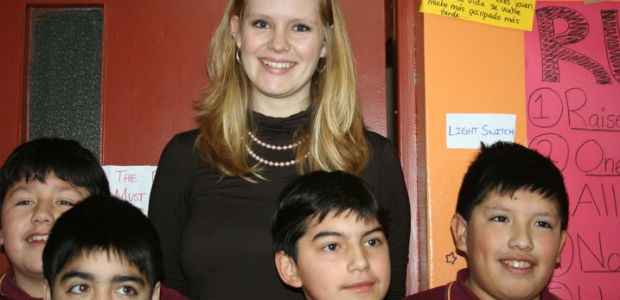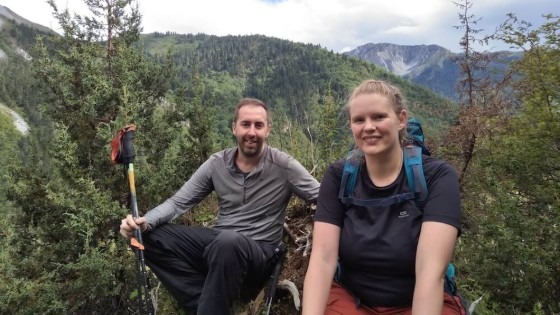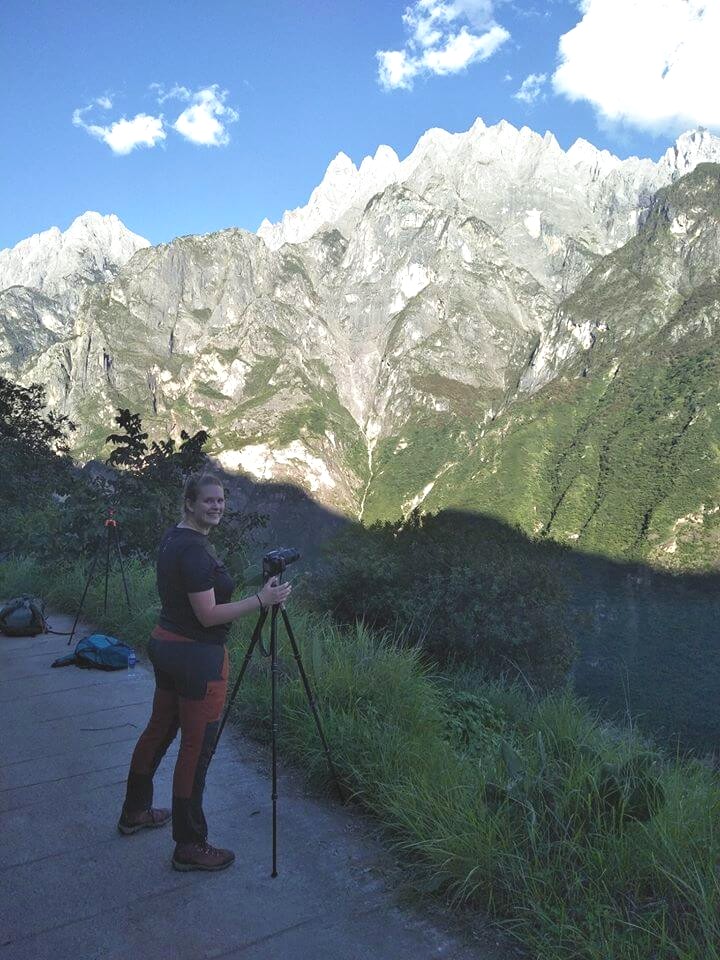Colorado native, Coleen, has been teaching English abroad for almost a decade now! She got her start in Patagonia, Chile, and has since taught throughout Asia. Learn what originally inspired her adventures and what it’s really like to make a career out of teaching abroad.
First, can you tell us about a bit about your background?
I’m from Colorado originally, but I always wanted to live abroad when I was younger. In university, I studied biological anthropology and studied abroad in Italy twice. At the end of my studies, I wasn’t ready to apply for graduate schools, and since I’d been selected as a Study Abroad Peer Advisor during my senior year of college, I already worked in international education. This was one track of my career that ran concurrently for several years with my ESL teaching. I would go away for a few months or a year and then return to do special projects, depending on what the international office at my alma mater needed.
By the time I graduated from college I was certain I would be teaching in China by the next year, but it ended up being later on (after Chile, South Korea, and London!).
How did you initially get into teaching English abroad and where was the first place you taught?
To be honest, I was super lucky that I was placed in the Peer Advisor programme at my university because several of the people working in that office were former ESL teachers. Some had done the Peace Corps or taught in far-flung places and I was hungry to go abroad again, so I made connections with them and talked about how to get into TEFL. My university also had a strong career advice office with connections to the ESL world, and they helped with the first programme.

Coleen with some of her students in the English Opens Doors program in Chile
The first programme that I did was the English Opens Doors (United Nations Development Project) placement in Chile, through Bridge. I lived at the very southern tip of the world, in Patagonia. It was a volunteer placement in a public school, and I lived in a host family. The programme included TEFL certification, which I took completed before going to my placement.
Browse online TEFL certification options.

Two of Coleen’s students in Patagonia, Chile
You’ve taught English in so many countries in your TEFL career – Chile, South Korea, Vietnam, and now China! Can you give us a timeline of your journey and tell us more?
This is a timeline of my teach-abroad experience so far:
Each place offered different opportunities and challenges, but I didn’t normally feel like staying in one place for long. I met my husband in Korea the first time we were both there, and from then on we travelled together and even worked together sometimes!
The flexible nature of the work is a real draw for us. We were able to save a lot of money without the effort that would be required if we were living in the USA or in his natal country. It also helps that between contracts we can use our savings to travel and see parts of the world we otherwise wouldn’t be able to see. This year we went to the Pacific Northwest on two holidays and also to Yunnan, China for hiking. We were able to afford going on longer travels for several summers in a row because of a combination of savings from our teaching jobs and doing volunteering in exchange for room/board. We’ve built an alternative lifestyle, and it works really well for us.
You were TEFL/TESOL certified with Bridge at the beginning of your career. How have you built on that initial training over the years?
I definitely used the TEFL certificate that I got from Bridge in the first position I was in, because I didn’t get much additional training! After a year and a half teaching in Chile and South Korea, I went to get my MA in Linguistics from University College London. The background I had from practical experience teaching my own native language to non-native speakers was valuable to me on that course, even if my approaches and experiences did not always line up with the theories presented.
Read more about earning an MA in TESOL. Is it right for you?
It made me do a lot of soul-searching about academia in general and my former plan to pursue a PhD, because the people teaching the MA course really seemed to be far removed from the realities on the ground I’d seen teaching abroad. In the end, I decided to go back to teaching English because I found it more rewarding and more grounded.
I also got certified through Cambridge to teach young learners and have used my experience in teaching to mentor others who come into ESL.
Can you tell us about your current teaching job in China?
Image of downtown Fuzhou
What city are you in?
Fuzhou, China.
What kind of school do you work for?
It’s a medium-sized private English company, similar to the Hagwon system of Korea.
Who are your students?
I teach all ages of kids and teens, from age 3 (officially, although sometimes a 2-year-old sneaks through) to 18.
What’s a typical workday like for you?
On Wednesday-Friday, we work 2-8:30 PM (I come in early to do lesson planning and administrative work, but we’re allowed to come in at 4:00 PM if we want to). Saturday and Sunday are the busy days, when we flip the schedule and work 8:30 AM-5:30 PM. This is because the students come to class outside their normal school schedule.
Typically I arrive around 2 PM and go through the lesson plans for the day. I check my PowerPoints for the classes and talk to colleagues about any classes that we share. At 5:25 the first classes for the day start and they are either 1 hour long (kindergarten) or 1.5 hours long (elementary and above). There’s a fifteen-minute break between classes most of the time.
I have chosen not to be a manager or a senior teacher for the moment because I like to be in the classroom. I want to be teaching. This means that I have fewer responsibilities outside school times, and have a lot of time to pursue creative arts. At the moment, I write fiction and nonfiction in the mornings, read a lot of books, study Chinese, and have time to cook almost all the meals we eat at home.
Do you find it challenging to live so far from home? If so, in what ways and how do you cope?
Coleen pursuing her interest in photography
Feeling “at home” as an outsider
In some ways it is difficult, but I’ve also been away from “home” for a long time. My husband isn’t from the same country as me, so we will always have at least two homes in this world. At this point, I miss every other place when I find myself in any other place. I’m not sure if that makes sense, but it’s like a constant feeling of both being “at home” and being an outsider.
Confronting opinions at home
That definitely extends to the States, as well. We were recently in my hometown for a wedding, and lots of people were shocked that we would be living in China. US news and the political situations of any country I’ve lived in often gets mixed into conversation when I go back to Colorado. It can be hard to confront a set narrative about a country.
For example, I lived in South Korea for more than 1.5 years total. The second time I went, my family and many friends were absolutely shocked that we would be moving back to Korea, given the tensions between the US and the North Korean regime at the time. Some people were totally off-base (Busan isn’t in North Korea, duh) but others were genuinely swayed by the predominant news narratives of that time, suggesting that we’d get nuked and begging us to reconsider.
When we arrived, it was business as usual in Korea, which is to say that it wasn’t a big deal and people weren’t running around panicked or anything. It’s really important to remember to be skeptical about the news and to read broadly to prevent losing out of living in amazing places due to this kind of weirdness. More than once, I’ve seen people freak out at a (biased) news story on US news and pack up their apartment to leave. I’ve not been a bystander to any international incidents yet in eight years, so I don’t think that it was worth their trouble.
Staying healthy
Otherwise, culture shock is my wheelhouse. I help new teachers to find healthy coping mechanisms because I used to do the same in my role as a study abroad advisor. I eat very healthy (smoothies are great for this) and I make sure that I get enough sleep. Those were the biggest problems when I was a younger teacher, and I was sick all the time because the kids are little mobile germ factories. I also hike a lot, which forces me out of my comfort zone and makes me feel like I truly know the cities that I live in (as in, not just the touristy side of things but also the big piles of trash outside neighbourhoods and the schools and the new metro stations and the old temples).
Please share a memorable experience you’ve had teaching abroad.
I’ll never forget the moment that I felt proudest of my efforts as a new teacher. It was the end of the semester at my school in Chile, and I was invited up during an assembly for them to give me a proper thank you. When it finally clicked for my students that I would not be coming back to their school, they rushed the floor and surrounded me. I couldn’t see every one of them, but I know I was still “teaching” them by saying, “Be careful! Don’t push!” and the like.
After the assembly, the best teacher in the school (the veteran special education teacher) came to my classroom as I was closing up shop for the last time. She gave me a necklace with tiny hearts forming the chain and explained that I would carry my students in my heart forever. “Bien hecho, Maestra,” she told me, which means “Well done, teacher.” I felt that I was finally a real teacher in that moment, and when times get tough now I remember that.
Traveling during her off-time in China
What recommendation do you have for someone who wants to teach abroad as a career, as you are doing?
Never stop learning and exploring
It’s really easy to get stuck in a rut and make yourself a nice, comfortable expat bubble to live in. I run into people at work in each of the country’s I’ve lived in who refuse to live in the country that they’ve moved across the world to live in. They eat mostly McDonald’s. They talk only with other ESL teachers. They don’t learn the language. They don’t use their money or vacation time to see new places. Above all, they complain about living abroad, which they chose to do by moving abroad. It’s frankly depressing!
You don’t have to be perfect, but making an effort to learn new things is the most important part of life in general, not simply a career abroad. if you move abroad, you’ve already done the hard part. No reason to try to recreate your life back home when you could be exploring.
Set boundaries
Another important thing is to set boundaries and know your limits. Sometimes in the past, I took on far more than I should’ve done, or allowed people I worked for to push me around too much. It’s not okay for people to treat you badly in an ESL job any more than it would be in any other job.
People who are drawn to teaching in any capacity want to help others and they want to live their lives in accordance with their values. That’s amazing, but it is also a potential way that you can get roped into doing too much (some employers know that your heart is in the right place and they want to exploit that). Speaking up can feel scary, but making sure that your contract is being honoured or that your time isn’t overly wasted with work commitments is key to long-term happiness.











